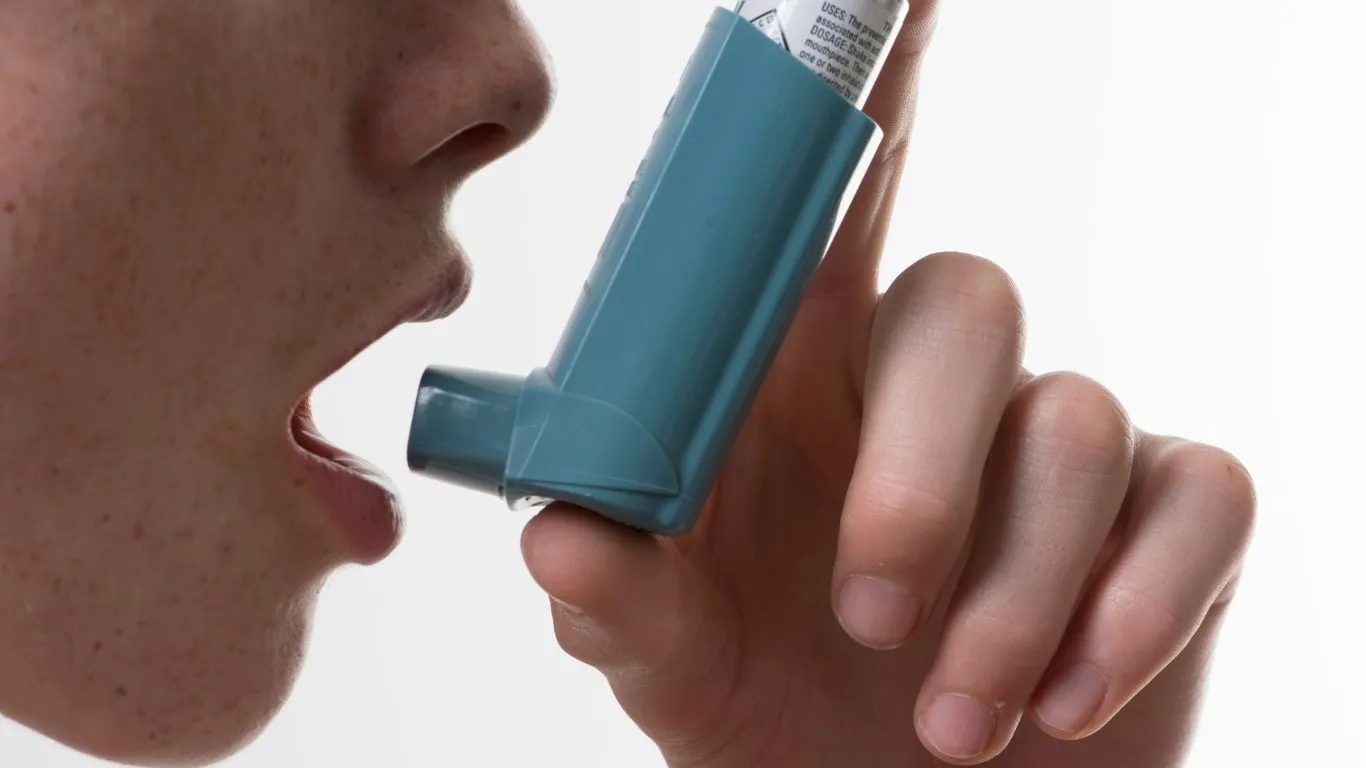Can Asthma Cause Swollen Tonsils? Key Factors and Effective Treatments
As a pulmonary nurse, I’ve seen many patients struggling with asthma, and one question that often comes up is whether asthma can cause swollen tonsils. It’s a question worth exploring because, even though asthma is primarily a respiratory condition, it can affect various parts of the body in ways you might not expect. I remember one particular case where a young patient had recurring tonsil infections, and her asthma seemed to make things worse. After a bit of research and collaboration with specialists, we figured out that the two conditions were linked in her case. Let’s dive into the science and real-life experiences to better understand how asthma might be connected to swollen tonsils.
Understanding Asthma: More Than Just Breathing Issues
Asthma is often seen as a simple respiratory problem, but it’s a bit more complex than that. This chronic condition involves inflammation of the airways, which leads to difficulty breathing, wheezing, coughing, and tightness in the chest. The inflammation can vary in intensity depending on the person and the environment they’re in. Asthma attacks can be triggered by allergens, respiratory infections, exercise, and even stress.

What many don’t realize is that the effects of asthma go beyond just the lungs. Since asthma involves inflammation in the body, it can trigger or exacerbate other inflammatory conditions, including issues with your tonsils. This is especially true for those with more severe forms of asthma. To understand how asthma could lead to swollen tonsils, we need to look at how inflammation impacts other parts of the body.
How Inflammation from Asthma Affects the Tonsils
Your tonsils are part of the lymphatic system, acting as the body’s first line of defense against harmful bacteria and viruses. They are located at the back of your throat and help trap germs before they can cause infections. However, when you have asthma, the constant inflammation in your airways could extend to other areas of your body, including your tonsils. Asthma-related inflammation can make your tonsils more vulnerable to infections or irritation, leading to swelling.
Additionally, the medications used to manage asthma, such as corticosteroids, can sometimes lower the body’s immune defenses. This could make it easier for bacteria or viruses to take hold in areas like the tonsils, contributing to swelling or even infection. So, when a person with asthma experiences swollen tonsils, it might not be just a coincidence—there could be a connection between the inflammation in the airways and the tonsils.

Common Symptoms of Swollen Tonsils in Asthma Patients
If you’re living with asthma and notice that your tonsils are swollen, it’s important to be aware of the symptoms that could indicate a more serious issue. Swollen tonsils might not always show up with the usual signs, especially for people who have asthma. Here are some symptoms you might notice:
- Sore throat: This can be mild or severe and is often worse when swallowing.
- Difficulty swallowing: The swelling might make it hard to eat or drink comfortably.
- Bad breath: This can be a sign of a bacterial infection affecting your tonsils.
- Ear pain: Swollen tonsils can sometimes cause discomfort that radiates to the ears.
- Fever: If the tonsils are infected, you might develop a fever.
It’s crucial to recognize these signs early. Swollen tonsils can lead to further complications like sleep apnea, difficulty breathing, or even more frequent asthma flare-ups if left untreated. In the worst-case scenario, untreated tonsil issues can lead to a condition called peritonsillar abscess, which requires immediate medical attention.
Can Asthma Medications Make Tonsil Problems Worse?
Now, let’s talk about the role that asthma medications can play in swelling your tonsils. Many people with asthma rely on corticosteroids, either in inhaler form or as oral medications, to help reduce airway inflammation. While these drugs are incredibly effective for asthma management, they can have some unintended side effects.
One such side effect is a weakened immune system, which makes it harder for your body to fight off infections. When the tonsils become inflamed or infected, they may take longer to heal. The combination of asthma and medication-induced immune suppression can make your tonsils more prone to swelling and infection. If you’re finding that your tonsils are regularly inflamed or infected, it might be a good idea to talk with your healthcare provider about adjusting your medication or exploring alternatives that might have fewer side effects.

When to See a Doctor: Signs That Asthma and Tonsil Issues Require Medical Attention
If you have asthma and are dealing with swollen tonsils, it’s important to keep an eye on your symptoms. While some mild swelling might resolve on its own, more severe symptoms could indicate a need for medical intervention. If you experience any of the following, it’s time to call your healthcare provider:
- Severe difficulty breathing: If you find it hard to breathe, especially if your asthma symptoms worsen, seek medical attention immediately.
- Persistent fever: A fever that lasts for more than a couple of days could indicate an infection.
- Severe pain or discomfort: If your throat or tonsils are causing significant pain, it’s worth getting checked out.
- Frequent or recurrent tonsil infections: If your tonsils are swelling up regularly, it could be a sign of a deeper issue.
Remember, even if you’re used to managing asthma on your own, don’t hesitate to reach out to a doctor if you’re concerned about your tonsils or your respiratory symptoms. They can help you figure out if there’s a deeper connection between your asthma and your swollen tonsils—and work with you on a plan to address it.
How to Manage Swollen Tonsils in Asthma Patients
If you’re an asthma patient dealing with swollen tonsils, managing both conditions simultaneously can feel overwhelming at times. The good news is that with the right strategies, you can alleviate symptoms and reduce the chances of future flare-ups. As a pulmonary nurse, I’ve worked with patients who’ve had success with some simple adjustments. Let’s take a closer look at ways to manage asthma and swollen tonsils together.

Stay on Top of Your Asthma Medication
When it comes to managing asthma, sticking to your prescribed medication is key. Asthma inhalers, including corticosteroids, help reduce inflammation in the airways, preventing asthma attacks. But as I mentioned earlier, these medications can sometimes lead to weakened immunity, making your tonsils more susceptible to infections. This means it’s even more important to ensure your asthma is under control so that you don’t have additional issues with your tonsils.
If you’ve noticed that your tonsils seem to get inflamed when your asthma is out of control, it might be time to re-evaluate your treatment plan with your doctor. Sometimes, adjusting the dosage or type of medication can make a significant difference. You might also want to explore a combination of inhaled steroids and rescue medications that can offer more balanced control.
Hydration: A Simple Yet Effective Solution
Hydration is something that’s often overlooked when dealing with asthma or tonsil problems. But staying hydrated can work wonders for both conditions. Dryness in your throat can aggravate your tonsils, making them more prone to irritation. Drinking water regularly can keep your throat moist, making it easier to swallow and less likely to become inflamed.
In addition, hydration helps thin mucus and can ease the airway congestion often experienced by asthma sufferers. As someone who’s seen the benefits firsthand, I can’t stress enough how important it is to keep water at hand throughout the day. Herbal teas can also be soothing, and they might even have mild anti-inflammatory effects. Just make sure to avoid drinks that can dry out your throat, like caffeinated beverages or alcohol.
Allergy Management: Preventing Tonsil Issues
Many asthma patients also suffer from allergies, which can exacerbate both asthma and tonsil problems. Allergens like pollen, dust, and pet dander can trigger asthma flare-ups and lead to swelling of the tonsils. If you know that you have allergies, it’s important to stay on top of them with the right medications. Antihistamines or allergy shots can help reduce the overall allergic response in your body, which may help prevent the tonsils from becoming inflamed in the first place.
Along with medication, try to avoid known allergens whenever possible. If you’re allergic to pollen, for example, consider keeping windows closed during high pollen seasons, using air purifiers, and avoiding outdoor activities when the pollen count is high. All of these actions can reduce the strain on your immune system, ultimately benefiting both your asthma and your tonsils.
Consider Tonsil Removal: When It’s the Right Option
In some cases, swollen tonsils can be so problematic that doctors may recommend tonsil removal, known as a tonsillectomy. This is usually considered when tonsil infections are recurrent or if they significantly affect your quality of life. If you’ve been battling tonsil issues for years and they continue to interfere with your asthma management, this could be an option worth discussing with your doctor.
Though tonsillectomies are relatively common, it’s not a decision to take lightly. It’s important to consider the risks and benefits, as well as the fact that the surgery comes with a recovery period. Personally, I’ve seen patients benefit from tonsil removal, but it’s crucial to work closely with your healthcare provider to determine if it’s right for you.

Natural Remedies to Soothe Swollen Tonsils
If you prefer natural remedies for managing swollen tonsils, there are several options that can complement your asthma treatment. Keep in mind, however, that natural remedies should never replace prescribed medication for asthma. Instead, think of them as supportive measures to alleviate discomfort.
- Saltwater Gargle: A warm saltwater gargle can help reduce inflammation and soothe a sore throat. It’s simple to do and can provide immediate relief.
- Honey and Lemon: Both honey and lemon have antibacterial properties that can help ease irritation and reduce inflammation in the tonsils. A warm drink made with honey and lemon can provide relief from the discomfort.
- Chamomile Tea: Chamomile has natural anti-inflammatory properties that can help calm irritated tonsils and reduce swelling. Drinking a cup of chamomile tea can be both soothing and relaxing.
- Steam Inhalation: Inhaling steam from a bowl of hot water or a shower can help clear the airways, which is helpful for both asthma and swollen tonsils. It also provides moisture to your throat, reducing the feeling of dryness or scratchiness.
While these remedies can be effective in easing discomfort, they should be used in conjunction with your primary treatment for asthma. Be cautious when trying natural remedies, and always consult with your doctor before adding them to your routine, especially if you are on other medications.
Regular Check-Ups: Don’t Skip Your Appointments
One of the best ways to manage asthma and swollen tonsils is by maintaining regular check-ups with your healthcare provider. Asthma is a chronic condition that requires ongoing management, and having open communication with your doctor can help prevent both asthma and tonsil issues from getting out of hand.
During these appointments, make sure to address any concerns you have about your tonsils or your asthma symptoms. If you feel like your medications aren’t working as well as they should, don’t be afraid to ask for a re-evaluation. Regular check-ups also allow your doctor to monitor how your asthma is progressing, ensuring that your treatment plan is still effective and safe.

Managing asthma and swollen tonsils may seem like a balancing act, but with the right approach and by staying on top of both conditions, you can keep your symptoms under control and improve your quality of life. Don’t forget to stay hydrated, manage your asthma medications, and keep regular appointments with your doctor to ensure you’re on the right track.
Long-Term Effects of Asthma on Tonsils and Throat Health
As we’ve seen so far, asthma can definitely affect the health of your tonsils, especially if asthma is not well-controlled. But what about the long-term effects of asthma on your tonsils and overall throat health? It’s essential to understand that managing your asthma isn’t just about handling flare-ups – it’s about preventing long-term complications, including chronic inflammation that could affect your tonsils over time.

Chronic Tonsil Inflammation and Recurrent Infections
When asthma isn’t controlled for long periods, it can lead to ongoing inflammation throughout the body. This includes your tonsils. Chronic inflammation in the tonsils can result in frequent infections and constant irritation. As a nurse, I’ve seen many patients whose asthma symptoms are exacerbated by repeated tonsil infections, leading to even more respiratory issues. This kind of cycle can make managing both conditions incredibly challenging.
If asthma and tonsil problems persist without proper management, patients may experience complications such as abscesses (a collection of pus), which can make it even harder to breathe. This is why it’s so important to manage asthma not just to avoid attacks, but also to prevent these longer-term complications from setting in. If your tonsils are inflamed frequently, it’s worth talking to your doctor about the best approach to avoid chronic problems.
Potential Impact on Sleep and Breathing Patterns
Another long-term issue that can arise from both asthma and swollen tonsils is the impact on sleep. Swollen tonsils, particularly when combined with asthma, can lead to sleep disturbances. When the tonsils become inflamed, they can block the airways, making it difficult to breathe at night. Asthma patients may already experience difficulty breathing during sleep due to airway constriction, and swollen tonsils can only add to the issue.
I’ve worked with patients who complained about snoring or waking up in the middle of the night feeling like they couldn’t catch their breath. For some, the combination of asthma and swollen tonsils can lead to sleep apnea, a condition where breathing is repeatedly interrupted during sleep. This not only affects the quality of rest but can also worsen asthma symptoms the following day. Addressing both asthma and tonsil problems is crucial to improving your overall quality of sleep and health.
The Importance of Regular Monitoring and Adjusting Treatment Plans
Managing asthma and swollen tonsils requires ongoing monitoring. It’s not something you can treat once and forget about. Over time, as your body and condition change, so too should your treatment plan. Regular check-ups with your doctor are essential for staying on top of both your asthma management and any issues with your tonsils.
In some cases, if you’re frequently experiencing tonsil problems despite taking medications for asthma, it might be time to adjust your treatment plan. Your doctor may recommend trying different types of asthma medications, such as leukotriene modifiers or biologic therapies, which can help reduce inflammation without relying as heavily on steroids. These adjustments can help reduce the likelihood of recurrent tonsil infections or chronic inflammation. Always be proactive in communicating your symptoms to your healthcare team so they can tailor your plan accordingly.
When to Consider Surgery: Tonsillectomy and Asthma
For some asthma patients, tonsil issues can become so frequent and problematic that surgery may be the best option. A tonsillectomy, or the surgical removal of the tonsils, can be considered if recurrent infections are affecting your ability to manage your asthma effectively. While it’s not a decision to be made lightly, tonsillectomies have helped many patients find relief from chronic tonsil problems and asthma-related complications.
However, this type of surgery comes with its own set of challenges, especially for asthma patients. The healing process after a tonsillectomy can be difficult, as the throat can become quite sore, and respiratory issues might temporarily worsen. As someone who has seen both the benefits and challenges of tonsillectomies in asthma patients, it’s important to work closely with your ENT (Ear, Nose, and Throat) specialist and pulmonologist to weigh the risks and rewards before deciding on surgery.
What to Expect After a Tonsillectomy
After a tonsillectomy, asthma patients may experience a period of increased sensitivity in their airways. It’s essential to follow post-surgery guidelines, including staying hydrated and avoiding irritants that could exacerbate asthma symptoms. In the first few weeks after surgery, patients should be cautious about engaging in strenuous activities or exposing themselves to environmental triggers such as smoke or strong odors, which can irritate the newly healed area.
While the recovery period can be tough, many patients report a significant improvement in their overall respiratory health post-surgery. By removing the tonsils, some patients find that their asthma symptoms stabilize and their throat health improves. For others, tonsillectomy can be a life-changing procedure, helping them to breathe more easily and experience fewer infections.

References
For more detailed information on asthma and its effects on other parts of the body, including the tonsils, consider visiting trusted medical sources such as the WebMD or the Mayo Clinic. These sites offer comprehensive information from health professionals on both conditions and their treatments.
Disclaimer
This article is not intended as a substitute for professional medical advice. Please consult with your healthcare provider for personalized guidance regarding your asthma and tonsil health. The information provided here is based on general research and personal experience, but every individual’s medical needs are different.

Bianca Nala is a compassionate Nurse Practitioner with a strong background in primary and respiratory care. As a health writer for Healthusias.com, she combines her clinical expertise with a talent for clear, relatable storytelling to help readers better understand their health. Bianca focuses on topics like asthma, COPD, chronic cough, and overall lung health, aiming to simplify complex medical topics without losing accuracy. Whether she’s treating patients or writing articles, Bianca is driven by a single goal: making quality healthcare knowledge accessible to everyone.







